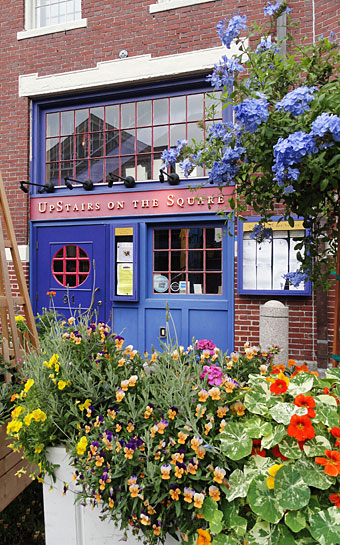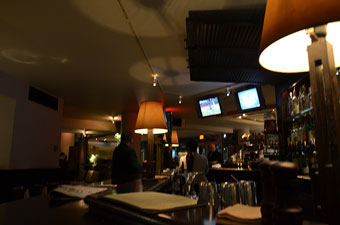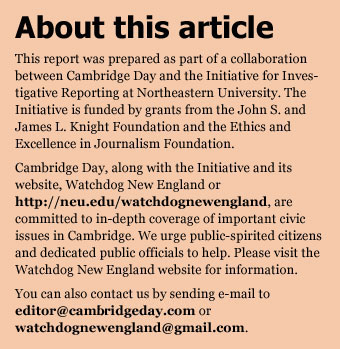Cambridge food inspectors alone in lacking power to fine

The co-proprietor of Upstairs on the Square, an oft-praised Harvard Square restaurant, says she appreciates food inspectors’ persistence in doing their jobs, even when the restaurant’s diligence fails and they find violations. (Photo: Gal Tziperman Lotan)
Mary Cleavers, a city food inspector, walked into Upstairs on the Square, the oft-praised Harvard Square restaurant, for a routine inspection Nov. 17. She passed the dining room, with its animal print carpets and menus featuring such dishes as $28 pork loin and $32 charcoal-grilled sirloin, and entered the kitchen.
There she found drain flies, dirty floors, wet clutter on the bar floor and a bowl of rusty water under the sink, according to inspection reports obtained by Cambridge Day. None of these violations are classified as “critical” by the city’s inspectional standards — not like, say, expired food or cooks touching food with bare, unwashed hands. But the restaurant still needed to correct them to comply with the state Food Code.
Cleavers noted the violations in her report and submitted copies to the restaurant and the city’s Inspectional Services Department. Three days later, she returned for a re-inspection and found that not only were the violations unremedied, but three new minor ones had sprung up. It took a third visit, on Dec. 7, for the violations to be corrected.
Mary-Catherine Deibel, the restaurant’s co-proprietor, did not contest the inspector’s findings, and in fact said she appreciated that inspectors were persistent in how they do their jobs. “We try to be very clean,” she said in an interview. “But it’s a busy restaurant. We’re almost like a small hotel — though that’s no excuse … It should be swept, and it should be perfect all the time. That is what we aim for as owners. Over 30 years, we’ve had a really good record.”
Faced with repeat offenses, the three restaurant inspectors charged with making sure the city’s 630 eating establishments are up to code have only one weapon to force improvements: threatening to revoke a restaurant’s permit for an afternoon, a day or as long as it takes to fix the problems.
The added sanction of recommending fines against problem restaurants, which is available to food inspectors in all neighboring communities, doesn’t exist in Cambridge.
And Cambridge inspectors rarely, if ever, shutter restaurants, according to Kristen Fernandes, a Cambridge food inspector for 10 years. Fernandes said she could not recall any forced shutdowns mandated by Inspectional Services during her years on the job. Boston, by comparison, has temporarily suspended 275 permits since 2008.
It isn’t just that Cambridge inspectors have fewer sanctions. There are comparatively fewer of them to handle the workload. Fernandes and her two colleagues inspect 630 establishments every six months — about 210 per person — a heavier burden than that of inspectors in surrounding cities. Watertown’s inspectors, who also deal with housing, nuisance and other complaints, inspect just 57 restaurants every six months. In Newton, each inspector visits 133 restaurants twice a year. Even in Boston, where inspectors have 3,500 establishments to worry about, the individual burden is lower — 194 twice a year.

Fees to get a restaurant permit in Cambridge are significantly lower than in Boston: Cambridge eateries must pay Inspectional Services just $25 a year ($50 if the restaurant serves alcohol) plus 75 cents per seat. Across the river, restaurants pay Boston’s Inspectional Services Department $200 a year, plus another dollar for every seat over 100 seats. Boston restaurants that offer takeout must fork over an additional $200 to $1,200 a year — the more money a restaurant makes, the higher the fee.
Charging higher fees could allow Cambridge to hire more inspectors, but would not give these inspectors more power when dealing with repeat offenders.
Officials are noncommital
Cambridge city officials who oversee Inspectional Services were noncommittal on the need to beef up the number and resources of food inspectors. Inspectional Services Commissioner Ranjit Singanayagam referred questions to City Manager Robert W. Healy, who sent them to the city’s Law Department. Two and a half weeks after the initial inquiry, Singanayagam e-mailed a brief statement suggesting the city would study the issue of allowing inspectors to fine problem restaurants.
“The city is always interested in exploring practices that may help to improve compliance with regulations or ordinances,” he said. “We will review the possible alternative enforcement method you have referenced and after review appropriate recommendations will be made as necessary to appropriate city officials. We will have no further comment until our review is completed.”
Mayor David Maher could propose that the City Council take the matter up officially, but Lee Gianetti, his chief of staff, said Maher wouldn’t make a decision until Inspectional Services drafted legislation. “The concept looks interesting for our perspective,” Gianetti said. “Once they have something concrete, we’ll comment on it.”
Under state law, inspectors must visit each food establishments once every six months for routine inspection, then return for re-inspections a few days to one week later until all violations are resolved. It is left to individual cities and towns to decide whether to issue fines or suspensions for restaurants that fail to maintain clean and sanitary conditions.
Ignoring repeat complaints
“Normally a good thing to do with them is to just sit them down for a hearing, bring in all the key players and have everybody sit down and talk about it, talk about why things are not getting taken care of when you’ve asked for them to be taken care of,” Fernandes said. “Usually that scares them enough.”

Harvest, another upscale restaurant in Harvard Square, had a recurring screen door violation in 2008 that shows that suggests a flaw in Cambridge inspection policy. (Photo: Michael Kappel)
Still, some restaurants, even the best-regarded, can ignore inspectors’ repeat complaints, according to a review of three years of inspection documents for several upscale restaurants obtained by Cambridge Day. Three years ago, inspector Bernard “Buddy” Packer found no screen door between the dish room and trash bin area at Harvest, a renowned upscale restaurant on Brattle Street. With no screen door, insects and other unwelcome critters could saunter into the kitchen. A door had to be installed to keep the restaurant up to code, Packer wrote in his report.
Packer came back for a re-inspection, then another. There was still no screen door in the dish room, according to inspection reports. The restaurant’s management said there was a door on order Oct. 2, 2008, and the restaurant passed inspection — but on the next inspection, April 28, 2009, there was again no screen door to be found. General Manager Peter Baker declined to comment and referred Cambridge Day to Paul Dias, senior vice president of operations at American Food Management, which owns several well-regarded restaurants in Boston and Cambridge. Dias did not return multiple calls for comment.
Over the past three years, inspectors also cited Harvest for four instances of missing refrigerator thermometers and four accounts of allowing cooks and food handlers to wear jewelry or watches — violations of the Food Code that, while not severe enough to shut down the restaurant, can still put patrons at risk of food-borne illness.
Wielding a ticket book
That’s why Fernandes and other inspectors would like the power to fine repeat offenders. Inspectors in Belmont, Newton, Watertown, and Brookline all have the power to impose fines and do so regularly.
The fines won’t solve any budget woes: They typically bring only about $1,000 to $2,000 a year into towns’ general funds. Still, when an inspector comes in wielding a ticket book, restaurant managers tend to pay more attention, said Patrick Maloney, Brookline’s assistant director of public health. Maloney said his inspectors can fine offenders $50 per violation per visit. They only use that power, however, for chronic code violators.
“What it’s useful for are stubborn issues, like food that’s left at the counter unprotected, keeping doors open that would allow flies and pests to come in to the establishment, or any other thing that the inspector would feel they’ve cited a restaurant for multiple times,” Maloney said.
Bad repeat offenders can also get permit surcharges, where the cost of their permit goes up the more they offend. Brookline inspectors can levy these surcharges when they’ve received valid food illness complaints. Belmont uses the same method.
“It’s like driving infractions. Let’s say you’re in a lot of accidents, your insurance costs go up,” Maloney said. “If you’re not keeping your establishment clean, we’re burning more energy on you … so your permit will cost more.”

